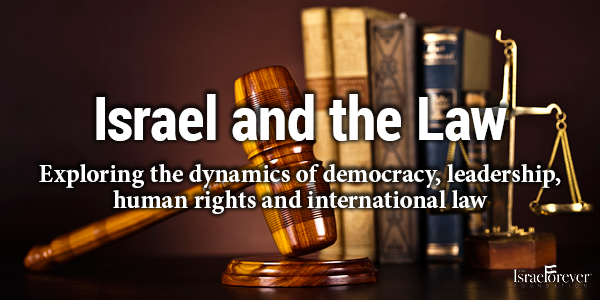International Right to Self-Defense: The Six Day War
By Jason Blau
Each year, we look back to the six days in June 1967 when Israel faced an overwhelming threat to its national survival, and overcame it against all expectations. As is generally known, Israel launched a preemptive war of self defense on opponents of vastly greater size, population, and military strength than her, in order to obtain a chance at surviving as a Jewish State.

In social media, mainstream journalism, and even in classrooms and family memory, unfortunately, many have twisted these events to portray the Six Day War as a war of aggression conducted by Israel against her neighbors, despite the opposite being the case.
Rather than reiterating the facts surrounding the leadup and chain of events in the infamous Summer of 1967 that forced Israel into an unwanted war yet again, a brief overview of international law on the topic that emphasizes the context can demonstrate the clear legality and justness of Israel’s actions. With literacy over Israel’s history waning among Jews surrounded by an abyss of lies, reintroduction to the historical truth is crucial to the general understanding of Israel’s rights, and Jewish rights, to the actions of the Six Day War and its consequences.
In the UN Charter, Article 51 explicitly says that, “Nothing in the present UN Charter shall impair the inherent right of individual or collective self defense.” It affirms previous international law, going back into the Middle Ages, in which a state has an absolute right to protect its existence from aggression.
This right of self defense applies in two cases. One, naturally, in which there is an actor who militarily attacks the state, obligating the targeted state to defend itself. The other case is preemptive war, in which there is a clear, overwhelming, and immediate danger to the party, and thus, under extreme circumstances, the state is justified in taking preemptive action, striking first in order to preserve its own existence.
This can be likened on a smaller scale to somebody walking through a dark alley, and upon seeing a shadowy figure quickly advancing on them with a knife, proceeds to punch the threatening individual, then grabs the weapon from the other’s hands. In this case, the justness of the event is clear. Instructing the person to wait until the attacker actually sticks a knife inside of them, in order to ensure that the potential victim is not mistaken in guessing the other’s intentions, would clearly be ridiculous. Just as an individual is justified in physically fending off a mugger, a state has the right, if not the obligation to its citizens, to do likewise when another entity acts dangerously or criminally.

Of course, the right of a first strike in self-defense is a dangerous notion, and must be used carefully, under limited circumstances, as it could easily be abused. This is why scholars of international law delineate between “preemptive war” and “preventative war”, in order to prevent renegade states from wrongly using this right. Preemptive war, what occurred in 1967, is what states have the right to, and it is a military action that breaks the peace to prevent an impending, unavoidable, and obvious threat to the nation.
This comes with two conditions: first, the state launching a preemptive war must believe that the threat is real and immediate, and second, the state’s response must be proportional to the harm threatened. The other type, preventative war, is much more controversial, and is a military action to prevent a potential future threat, rather than a clear and unavoidable one. This type will not be discussed in depth, as the 1967 conflict is an obvious example of a preemptive war, certainly within the international right of a state to self-defense.
After the Suez Crisis of 1956, in which Israel withdrew from the Sinai Peninsula, two specific measures were implemented by the international community to prevent a return to conflict. First, the right of free navigation of international waterways was affirmed in connection with the Straits of Tiran, which more than 90% of Israel’s oil passed through. Then, the United Nations Emergency Force (UNEF) was created, and with consent of both Egypt and Israel, stationed in the Sinai Peninsula to ensure compliance with the 1949 armistice agreement.
This “effectively formed a patrolled barrier, whereby either side would have to attack UN troops first in order to attack the other nation. Shortly after this agreement, Gamal Abdel Nasser, the leader of Egypt, the strongest Arab state, and widely regarded as the leader of Arab nationalism in the mid-20th century, stated before the General Assembly of the United Nations, "The only solution to Palestine is that matters should return to the condition prevailing before the error was committed — i.e., the annulment of Israel's existence."
The context of the preceding years and international law are clear - Israel’s rights to sovereignty and self-defense are set in stone.
May 14th, 1967: Egypt begins sending multiple military divisions, essentially an army, into the Sinai without warning
May 16th: Egypt orders the UNEF out of the Sinai Peninsula, despite its pledge in 1956 to maintain the armistice
May 19th: The Israeli Cabinet informs Egypt, through intermediaries, that the forced withdrawal of the UNEF is regarded as an aggressive act, and that the closure of the Straits of Tiran would be regarded as an act of war by Egypt against Israel
May 23rd: Nasser closes the Straits of Tiran to Israeli shipping
May 26th: Nasser states on the radio that the closure of the Straits of Tiran shows that Egypt is ready for war, and that the objective will be the destruction of Israel
May 30th: Jordan signs a five-year military alliance with Egypt and Syria for joint cooperation and integration of their respective armed forces
May 31st - June 4th: Accelerated military buildup in the Syrian Golan Heights, the Egyptian-controlled Sinai Peninsula, and the Jordanian West Bank
June 5th, 1967: Israel launches Operation Focus, beginning the Six Day War
Start the Conversation
Taking both the legal framework and the facts of the case into consideration ask of yourselves and of friends:
- Was this a case of preemptive or preventive war?
- Did Israel strike against a perceived clear, overwhelming and imminent danger to the state?
- Not knowing the victory Israel would win, does the leadup to war seem like premeditated aggression?
- What could Israel have done differently?
- Had you been in the Israeli cabinet, knowing only what they did, what would you have thought?
- In other words, what would you have done?
Jerusalem is our eternal capital, united with and unseparable from our nation and our homeland
Learn why Jerusalem is above politics
Recommended for you:
About the Author









